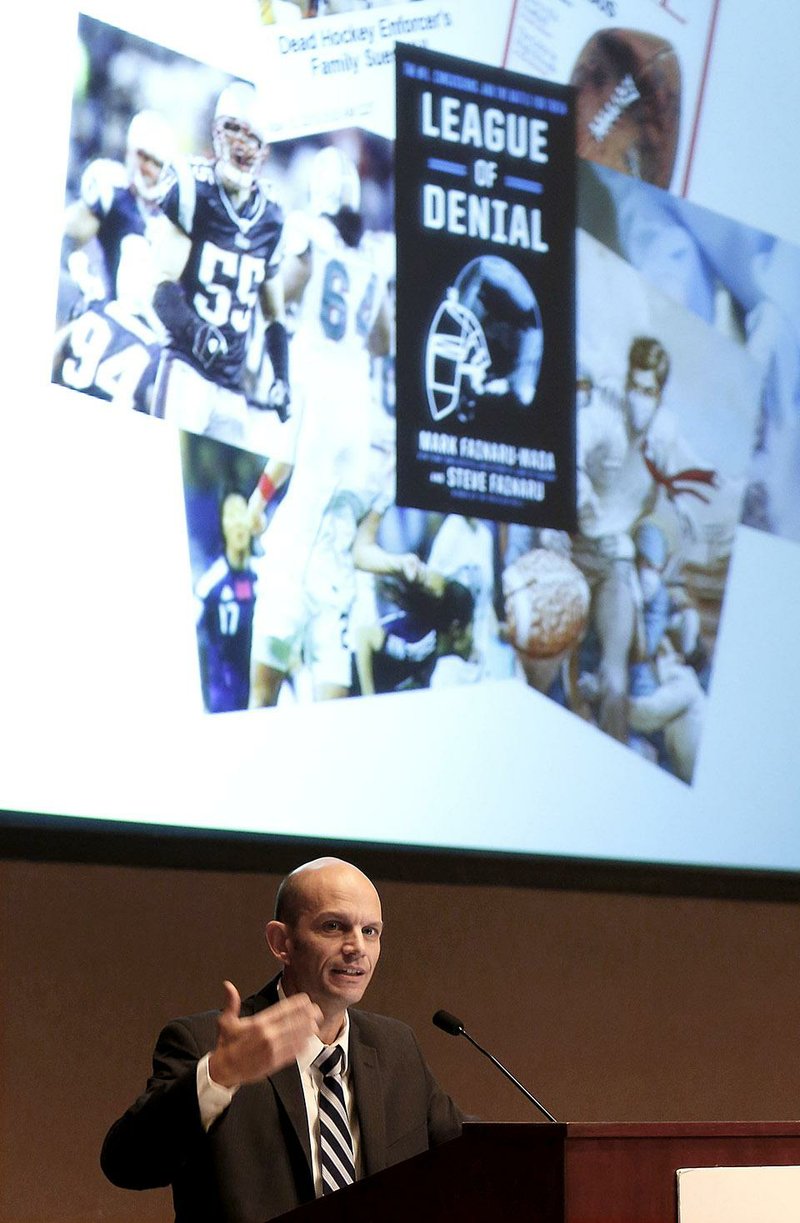Parents worry about the risks of a concussion in youth sports, and more research is needed to give parents and coaches better information on the injury, said R.J. Elbin, director of the new Office of Sport Concussion Research at the University of Arkansas at Fayetteville.
"We need to provide evidence for the concern," Elbin said. "We want people to play youth sports, and we want them to play them safely."
During Elbin's opening presentation Friday at a Concussion in Youth Sport Research Summit on campus, he discussed the results of an ongoing survey of parent perceptions of concussions in sports to illustrate the concern that exists.
While 517 parents reported their children had not had a medically diagnosed concussion, a similar number reported being concerned their children would experience a concussion while participating in youth sports. More than 200 reported they would not allow their child to participate in tackle football because of concerns about concussions.
The data are unpublished, but Elbin discussed responses gathered so far from 739 soccer parents in Arkansas, Alaska, Colorado and Washington.
Much of the existing research on concussions has focused on high school, college and professional sports, although the numbers of children under 13 participating in sports towers above those participating in sports at higher levels, said Elbin, an assistant professor of kinesiology at UA.
Jeff McGee, head athletic trainer for the Bentonville School District, agreed with the importance of educating players and parents about concussions. Athletic trainers use a series of tests to assess multiple parts of the body for athletes suspected of having a concussion.
He said most of the tests make it difficult for athletes to mask symptoms, but some symptoms can't be seen.
"There are athletes who will not say anything," McGee said.
Tackle football nationwide involves about 75,000 professional and college athletes, 1 million high school students and 3 million children under age 13, said Anthony Kontos, assistant director of research at the University of Pittsburgh Medical Center Sports Medicine Concussion Program. He's also an associate professor for the university.
Research and knowledge about concussions are much greater for professional and college athletes than for the youngest players of the sport, including the incidence rates of concussions, he said.
Kontos was involved in a 2013 study published in the Journal of Pediatrics that found that concussions were 26 times more likely to occur in games than practices.
The 2013 study found that about 45 percent of concussions were caused by helmet-to-helmet collisions, which can be prevented by teaching children proper tackling techniques and discouraging illegal plays, he said.
When a hit to the head occurs, assessing the injury requires multiple tests because of the varied responses players experience after a concussion, such as anxiety, eye movement, migraines or deficits in short- or long-term memory, Kontos said.
Players who lose consciousness or throw up have been found to recover from the injury more quickly, possibly because they're unlikely to return to the game, Kontos said. Players tend to have longer recovery periods if they feel foggy or experience dizziness or post-traumatic migraines.
Treatment for concussions requires an individualized approach, Kontos said. Often, rest is prescribed during the recovery period, but some research indicates lengthy periods of rest sometimes worsen symptoms, he said.
Numerous concussions are not diagnosed because athletes don't report head injuries, often so they can continue playing, said Tracey Covassin, director of the Michigan State University Sport-Related Concussion Laboratory.
A 2004 study found that 50 percent of concussed high school players reported not telling anyone about a head injury, a finding that some researchers attributed to a lack of awareness. A 2013 survey of concussed athletes found that about 40 percent reported not telling anyone about their injury, despite increased awareness.
Covassin said a change in culture is needed that must start with the youngest players.
Metro on 11/15/2014


